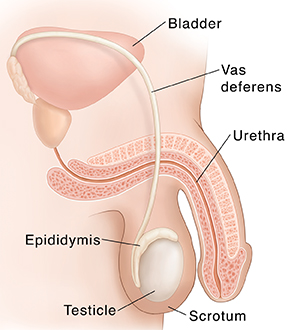What Are Epididymitis and Orchitis?
The epididymis is a coiled tube. It is part of the male reproductive system. A man’s two testicles sit inside the scrotum. One epididymis sits behind each testicle. Epididymitis is inflammation (swelling and irritation) of this tube. Orchitis occurs when the inflammation spreads to the testicle.

Normal flow of sperm and urine
Sperm are made in the testicles. Sperm travel from the testicles through the epididymis. They flow into a tube called the vas deferens. During ejaculation, sperm pass from the vas deferens through the urethra out of the body. During urination, urine flows from the bladder through the urethra out of the body.
How the problem starts
The problem is thought to be caused by bacteria. If bacteria get into the urethra, they may cause an infection. Infection can then travel up the urethra into the epididymis. This leads to inflammation. Pain and swelling can then spread to the testicle. This is called orchitis. In rare cases, orchitis can be from an infection with the mumps virus. There are 2 kinds of inflammation:
Online Medical Reviewer:
Callie Tayrien RN MSN
Online Medical Reviewer:
Marc Greenstein MD
Online Medical Reviewer:
Raymond Kent Turley BSN MSN RN
Date Last Reviewed:
9/1/2022
© 2000-2025 The StayWell Company, LLC. All rights reserved. This information is not intended as a substitute for professional medical care. Always follow your healthcare professional's instructions.